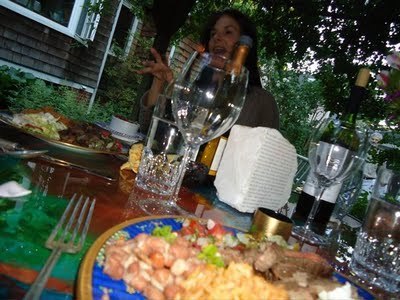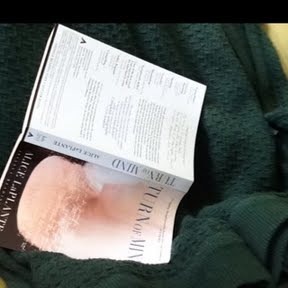Beth Kephart's Blog, page 238
June 9, 2011
Sarah Ruhl on the Lightness of Being
 From a conversation between John Lahr and Sarah Ruhl, "one of America's most frequently produced playwrights." The words are Ruhl's:
From a conversation between John Lahr and Sarah Ruhl, "one of America's most frequently produced playwrights." The words are Ruhl's:Lightness isn't stupidity. It's actually a philosophical and aesthetic viewpoint, deeply serious, and has a kind of wisdom—stepping back to be able to laugh at the horrible things even as you're experiencing them. (The New Yorker, May 30, 2011)I'm daring to take those words to heart. I'm trading the heat of this day for a memory of winter. I'm celebrating M.Y., one of the smartest and most successful and most sublimely silly people I know, for making me laugh out loud in a corporate corridor. I'm seeing the bright in what might have been dark. I'm not letting the quick jab or the long silence topple me. And I'm not nearly as tired as I was.




Published on June 09, 2011 14:04
Nostalgia
Published on June 09, 2011 05:03
June 8, 2011
Honoring His Loss: Aleksandar Hemon's Heartbreaking Story
 You don't know what you will find when you decide to take an hour and sort through the magazines that have lately arrived. Typically I read The New Yorker back to front. Not today. I simply opened the June 13/20 issue and let the pages fall where they may. It was the Personal History page, a story titled "The Aquarium." It was Aleksandar Hemon, a writer whose not-quite-a-novel,
The Lazarus Project,
I had genuinely loved.
You don't know what you will find when you decide to take an hour and sort through the magazines that have lately arrived. Typically I read The New Yorker back to front. Not today. I simply opened the June 13/20 issue and let the pages fall where they may. It was the Personal History page, a story titled "The Aquarium." It was Aleksandar Hemon, a writer whose not-quite-a-novel,
The Lazarus Project,
I had genuinely loved.
In the heat of the day, I began to read: "On July 15, 2010, my wife, Teri, and I took our younger daughter, Isabel, to the doctor for a regular checkup. She was nine months old and appeared to be in perfect health."
These are the simplest, most straightforward of words. Not meant as poetry or artistry, but as brutal and most terrifying fact.
We can't live Hemon's story by reading it. We cannot take away the pain. We cannot learn more about how to survive or what to offer those who somehow must survive the hardest imaginable things. And yet there I was with The New Yorker on my lap, reading Hemon's story through, searching my own soul for something to say, some way to reach out, some absolute fiber of meaning, but no: I could only read and only feel this great and unappeasable sadness.




Published on June 08, 2011 18:14
Girls in Wash of Blue (and what I'm reading)
 Glasses up. Glasses on. No glasses.
Glasses up. Glasses on. No glasses.Don't ask me why (my own brain processes often elude even me, the owner of this most porous brain), but this photograph symbolizes my changing relationship to books as I try to decide what to read in hardback, paperback, and iPad2-ery.
Just now, I've ordered the following from the Kindle Store:
A Day in the Life of a Smiling Woman: Complete Short Stories (Margaret Drabble)
Desperate Characters (Paula Fox)
The Coffins of Little Hope (Timothy Schaffert)
Faith (Jennifer Haigh)
The Paris Wife (Paula McLain)
These join the following to-be-read Kindle titles (I read both before, as real books):
Selected Stories (Andre Dubus)
Sophie's Choice (William Styron)
They all join Tara Altebrando's Dreamland Social Club—a real book, a hardcover, as my next reads.
I'll be reporting back, of course.
In the meantime, might I note how glad I have been to be hearing from my students during these summer months. Might I say, too, that I am grateful that there is a new generation of smart young souls who know how to use language—know where sentences begin and end, know, unprompted, how to eliminate their own redundancies, lean into the music. How you are needed. How valued you are. How you might save the world.




Published on June 08, 2011 05:35
June 7, 2011
Paul Hankins, The English Companion Ning, and Teachers Who Teach Teachers
 I'll try to keep this brief: In September of last year, I was invited into a classroom of eighth graders by a teacher for whom I have enormous respect. I was there to talk about Nothing but Ghosts, but mostly I was there to do one of the things that I most love to do, which is to hang out with young people and talk with them about the books they read, the things they write, and the lives they dream of living.
I'll try to keep this brief: In September of last year, I was invited into a classroom of eighth graders by a teacher for whom I have enormous respect. I was there to talk about Nothing but Ghosts, but mostly I was there to do one of the things that I most love to do, which is to hang out with young people and talk with them about the books they read, the things they write, and the lives they dream of living.(Okay, this is not auguring brief, but I go intrepidly on.)
At the close of that session, the teacher suggested that I look into something she called the English Companion Ning, an award-winning online social networking tool for English teachers that advertises itself, in part, as "a place to ask questions and get help... a cafe without walls or coffee: just friends." I do teach, of course, but at a university. The time I spend in middle school and high school classrooms is frequent, but sporadic. I don't actually fit into this community, in other words, but I was welcomed in, and I have gained enormously from the Ning conversations that carry on. Mostly I have gained a great appreciation for how right so many English teachers try to make their classrooms, how much they care about the books their students read, and how creative they are in their responses to educational needs and learning styles.
Recently, as you can imagine, there's been a conversation about the now-infamous Wall Street Journal article, "Darkness Too Visible," by Meghan Cox Gurdon. I don't need to review well-trod ground: Gurdon wrote, among other things, of her concern that YA work is getting darker, and that such darkness may be dangerous, noting: "Yet it is also possible—indeed, likely—that books focusing on pathologies help normalize them and, in the case of self-harm, may even spread their plausibility and likelihood to young people who might otherwise never have imagined such extreme measures."
The essay was, of course, a lightning rod, provoking all manner of response and reigniting that familiar debate about what YA should and could be. I have my own reasons for writing the kinds of YA books that I write—will be forever grateful to Laura Geringer who invited me into this YA world in the first place. Laura didn't mind that I love language and that my stories always seem to revolve around bright, seeking, big-hearted young people. She didn't marginalize me because I do not have within me a vampire tale or even (I'll be honest) any actual vampire or dystopian knowledge. She said, "Write and see what happens," and what has happened is that I have met, through my books, an astonishing group of young people who have entered my life as a second family.
The point I set out to make today does in fact have to do with that aforementioned English Companion Ning. It has to do with the quality of conversation now ongoing in response to Ms. Gurdon's WSJ essay. Back and forth these teachers go, in all civility—suggesting, defending, opposing, reformulating, teaching each other and me about the books they introduce into their classrooms, the books they hope kids will read on their own, and the conversations they sometimes have with parents about books in which darkness pervades.
At the center of this conversation is one Paul Hankins, a Ning administrator, an ALAN board member, a Facebook treasure, and one heck of a teacher/reader whose path has crossed mine from time to time. I fervently hope that Paul does not mind me pulling a small quote from his Ning comments today. If anyone wonders what real teachers do, please think of Paul, and be grateful for him. Think of all the teachers who care.
Less than 80% of my students will have passed the GQE (graduation exam) when they come into Room 407 next fall. Last year, I had eighteen (remember our school is small) students with special needs. In one room alone, six of the twenty-eight students required some form of assistance and an aide was assigned to work with me in helping these students to navigate works like The Crucible, Of Mice and Men, and Tuesdays with Morrie. But we also tackled Speak by Laurie Halse Anderson. And many more texts.
Using a 40 Book Invitation, I was able to advise readers as they moved through genres like Plays, Memoirs/Autobiographies, Poetry, Historical Fiction, Non-Fiction, Graphic Novels, Illustrated Texts/Picture Books, and American Classics. At the end of the year, my 150 juniors read almost 4000 titles. We celebrated this at the end of the year.




Published on June 07, 2011 06:08
June 6, 2011
Peaceable Kingdom (2)
 You might think this is a tilted picture, a mistake, but look again: That's my friend Elizabeth Mosier, just beyond a most delicious platter, beyond a candle decorated with a page from her first book, beyond flowers, artfully arranged. And in between it all—caught, a sliver—is her dear husband, Chris Mills. I was there to celebrate the impending release of Elizabeth's novella, The Playgroup, which I had the privilege of reading early on.
You might think this is a tilted picture, a mistake, but look again: That's my friend Elizabeth Mosier, just beyond a most delicious platter, beyond a candle decorated with a page from her first book, beyond flowers, artfully arranged. And in between it all—caught, a sliver—is her dear husband, Chris Mills. I was there to celebrate the impending release of Elizabeth's novella, The Playgroup, which I had the privilege of reading early on.It was a cool night. There was a sweet breeze. Elizabeth and Chris's beautiful girls were just inside. The moon was rising over the backyard theater. A roof of blooms nearly cushioned our heads. Every now and then, I'd glimpse beyond Libby, to the kitchen, see Chris at the sink arranging flowers or there by the counter, scrubbing things down.
This is all I want to say (beyond please buy The Playgroup when it's released; Libby has a fierce and intelligent voice): There is something very beautiful about being with a family whose members love each other, are happy for each other, support and nurture each other.




Published on June 06, 2011 13:53
June 5, 2011
Mini Me: Reflections on my remaindered Seeing Past Z
 This past week I've heard from three dear souls about a book I once wrote called Seeing Past Z: Nurturing the Imagination in a Fast-Forward World. It was a memoir, my fourth. It was an argument for giving children room to breathe, a story about the imagination and about the young peoples' writing workshops I conducted in my home. Seeing Past Z was a story about the kids I met, the stories we read, the things the kids wrote while I was near. It was me loving out loud, like I do.
This past week I've heard from three dear souls about a book I once wrote called Seeing Past Z: Nurturing the Imagination in a Fast-Forward World. It was a memoir, my fourth. It was an argument for giving children room to breathe, a story about the imagination and about the young peoples' writing workshops I conducted in my home. Seeing Past Z was a story about the kids I met, the stories we read, the things the kids wrote while I was near. It was me loving out loud, like I do.I published Seeing Past Z in 2004 at the height of the competitive parenting era, when children's dreams were often proscribed, their futures chosen, their schedules packed, their resumes shined. Honoring the unquantifiable imagination, talking about the sweetness of community over the attainment of blue ribbons, was probably foolhardy in the midst of all that, but a few years later, the tide had turned. Slow parenting was gaining force. Character was again in vogue. A recession hit and many of those who had been primed for greatness faced unanticipated woes.
By that point, Seeing Past Z had been remaindered. I'd received my two boxes full of unsold books and paid the shipping price. I'd been sent the sad sales figures. It was almost as if the book hadn't happened, though I am reminded, every now and then, that it did. Once by a young woman who had found a copy in her Singapore library and wrote to tell me about it. Several times by neighbors passing by, sometimes by teachers, sometimes (thank you) by bloggers.
But last week was unusual—an odd confluence of notes and conversations about a book I'd always quietly believed in. These are the valued surprises in a writer's life. These are notes we value more than readers can imagine.




Published on June 05, 2011 12:20
June 4, 2011
Turn of Mind/Alice LaPlante: Reflections
 As readers of this blog know, I brought but a single ARC home with me from the BEA. Partly because I was running across town directly after my short stint at the show and needed to be light on my feet. Mostly because I'm a tried-and-true book buyer. Obsessive and shelf-wearying book buying is the vote I cast for the industry I'm so lucky to be a part of.
As readers of this blog know, I brought but a single ARC home with me from the BEA. Partly because I was running across town directly after my short stint at the show and needed to be light on my feet. Mostly because I'm a tried-and-true book buyer. Obsessive and shelf-wearying book buying is the vote I cast for the industry I'm so lucky to be a part of.The book that slipped into my bag was the one those at the Grove/Atlantic booth shared after I asked what title on their list was creating the most buzz. Turn of Mind, they said, without a second's hesitation. A debut novel by Alice LaPlante that has apparently had the booksellers exclaiming for months.
Mind is about murder and dementia. It's about the death of a retired orthopedic surgeon's best friend. Who killed Amanda and why? Will Dr. Jennifer White remember—can she remember—if she had anything to do with her neighbor's murder and mutilation? What do the notes she's been keeping reveal? What do the medications being foisted on her do to her ability to see and clarify what might have been? And who are all these people moving in and out of her present life? Were they loved? Did they love her? What is real?
It's truly terrifying territory. Jennifer White is an educated, skilled, respected woman who has, it is revealed in pieces, lived a strangely smudgy life. Her family life hasn't been what it might have seemed. Her relationship with Amanda is anything but straightforward. There's real anger here, real messiness, real cause for distrust—and yet. The murder of Amanda was meticulously carried out, and Dr. Jennifer White has long since moved beyond meticulous.
How is it that a woman can lose herself and still retain some self-querying aspects of her wit? How can she know and not know at the same time? I found myself marveling at LaPlante's audacity as an author—at her ability to construct this mind, now so slippery and unstable, and to see this complex plot all the way through.
The book is told, as it must be told, in a succession of fragments—a line or two or three of something remembered or something right now, then white space. It recalled for me Carole Maso's groundbreaking Ava, which captures the morning, noon, and later day of a dying woman's final moments.
[I just googled Ava to see if it is still in print and found that one can read it on line. I am amazed by this, but there it is. An unexpected sidenote for this blog post.]
I suspect that the booksellers are right: Turn of Mind will have readers emphatically talking, bloggers opining, book club members up late at night. It's a chilling story. Dementia is chilling. LaPlante brings its fog and smear to vivid, shivering life.




Published on June 04, 2011 16:55
An iPad2 blogging experiment
In preparation for our upcoming time away, I am teaching myself how to use the BlogPress app on iPad2. This, ladies and gentleman, is a Beth first. An iPad2 photo taken of the chair where the book I am supposed to be reading sits unread (or partially read). An iPad2 posting. And a Beth, one hour later, a tad less frustrated than she was, say, an hour ago.
Quote from my husband, standing near: "You just need a tiny little bit of patience." You need to see the hand gesture to get the full effect.
Amy of Amy @ My Friend. I almost had to call you. Almost.
- Posted using BlogPress from my iPad






Quote from my husband, standing near: "You just need a tiny little bit of patience." You need to see the hand gesture to get the full effect.
Amy of Amy @ My Friend. I almost had to call you. Almost.
- Posted using BlogPress from my iPad





Published on June 04, 2011 10:12
An experiment
In preparation for our upcoming time away I am teaching myself how to use the iPad blog press app. This, ladies and gentleman, is a Beth first.
- Posted using BlogPress from my iPad






- Posted using BlogPress from my iPad





Published on June 04, 2011 10:12






